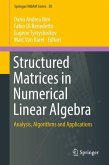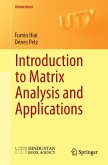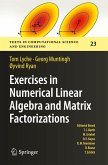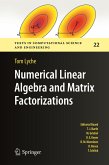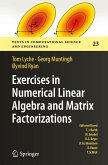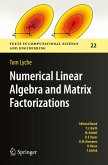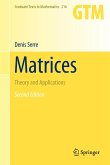This textbook offers a fresh and balanced approach to the study of Linear Algebra in the context of modern Data Science. Whereas many existing texts either emphasize theory with little connection to practice or jump straight to applications with minimal mathematical explanation, this book provides equal weight to both foundations and applications.
Designed for undergraduates who have completed a proof-based Linear Algebra course, it introduces concepts and tools from Matrix Analysis that are essential for Data Science and Machine Learning. Topics include:
Vector norms and distances, orthogonality, and projectionsMatrix factorizations such as LU, CR, QR, and SVDSpecial matrix types: symmetric, positive definite, nonnegative, stochastic, and covariance matricesKey numerical algorithms, including the QR algorithm and the Power Method
Each chapter is enriched with real-world applications from Google PageRank and Principal Component Analysis to clustering, dimensionality reduction, and linear regression highlighting the role of matrix methods in Data Science.
To further support hands-on learning, the book is accompanied by a GitHub repository with Python labs, allowing students to implement the techniques covered and bridge the gap between theory and computation.
With its clear explanations, practical insights, and balance of theory and application, Matrix Methods in Data Analysis is an invaluable resource for courses in applied Linear Algebra, Data Science, and introductory Machine Learning.
Designed for undergraduates who have completed a proof-based Linear Algebra course, it introduces concepts and tools from Matrix Analysis that are essential for Data Science and Machine Learning. Topics include:
Vector norms and distances, orthogonality, and projectionsMatrix factorizations such as LU, CR, QR, and SVDSpecial matrix types: symmetric, positive definite, nonnegative, stochastic, and covariance matricesKey numerical algorithms, including the QR algorithm and the Power Method
Each chapter is enriched with real-world applications from Google PageRank and Principal Component Analysis to clustering, dimensionality reduction, and linear regression highlighting the role of matrix methods in Data Science.
To further support hands-on learning, the book is accompanied by a GitHub repository with Python labs, allowing students to implement the techniques covered and bridge the gap between theory and computation.
With its clear explanations, practical insights, and balance of theory and application, Matrix Methods in Data Analysis is an invaluable resource for courses in applied Linear Algebra, Data Science, and introductory Machine Learning.


